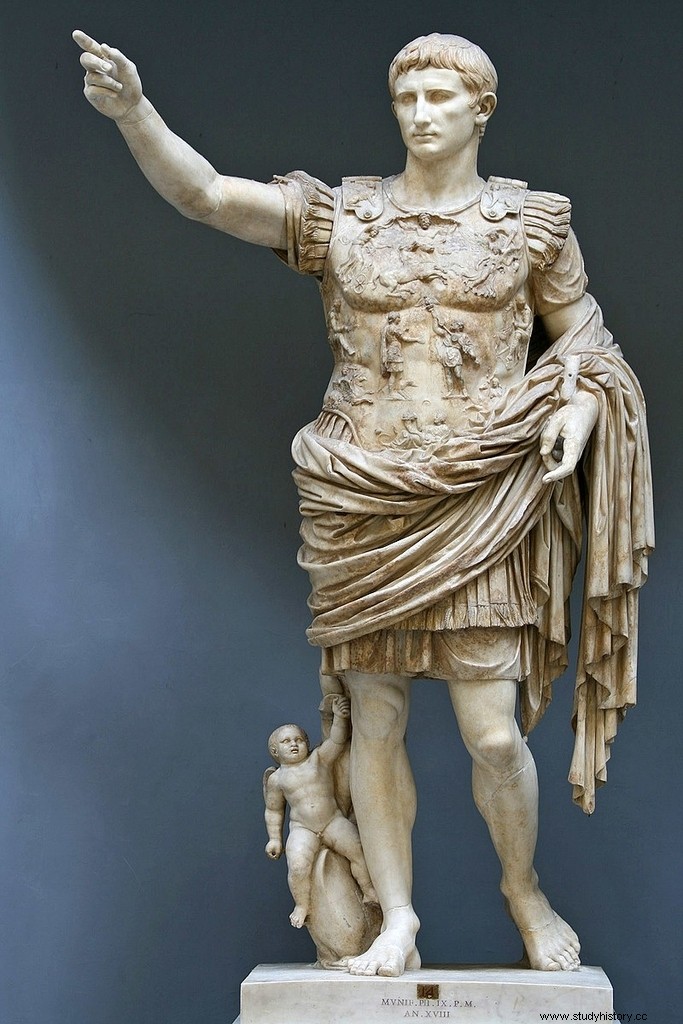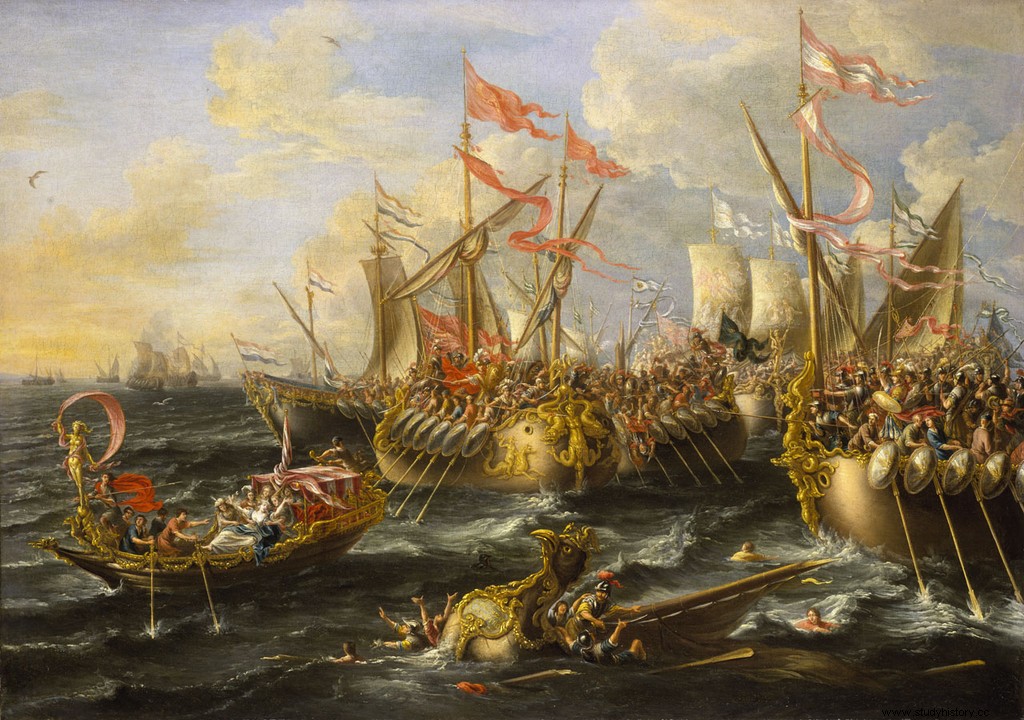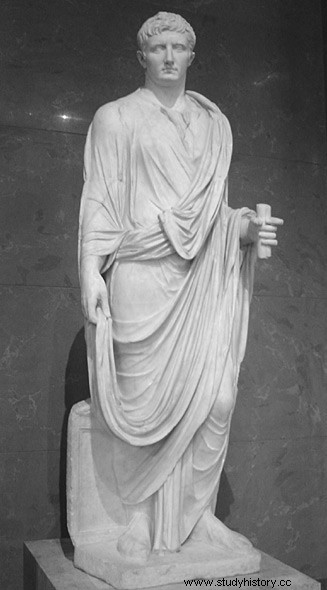
Unfortunately, few Japanese people are named when considering the history of the world. Ryotaro Shiba, a well-known Japanese historical writer, says, "Japan couldn't have a hero at last," but if you dare to say it, only Heihachiro Togo is known in the world.
There are quite a lot of excellent people in Japan. Ieyasu Tokugawa, Nobunaga Oda, Hideyoshi Toyotomi, this area will be at the level of world history if only the ability is considered.
However, considering the degree of influence it has had on world history, it is still very small.
So who has the most influence on the history of the world?
There are many names on this question.
Augustus, the first Roman emperor, is probably one of the first to be named.
He became Caesar's successor at the age of 18
The impact of ancient Rome on world history is immeasurable.
The Renaissance, which flourished in Italy in the 14th century, was a revival of Greek and Roman culture, and many countries still use "Senatus" for the Senate as the word for the Senate.
It is no exaggeration to say that the English word is derived from Latino, which is an ancient Roman word, and there are many researchers in Roman history, and the representative, Theodor Mommsen, won the Nobel Prize in Literature. Actually won the award.
It has a lot of other influences, but if I write them, it will be a tremendous amount, so I would like to write about that from time to time.
By the way, it was Julius Caesar who was said to be "the only creative genius born of Rome" by Mommsen in such Rome, and he came to the point of unifying Rome, which was in a state of civil war.
He became a lifelong dictator and undertook various reforms, but was killed by senators who feared dictatorship.
Caesar left his will in his lifetime, whether he expected his assassination or not.
The content shook a tremor all over Rome.
In his will, Caesar said that he would adopt a young man named Octavian and inherit the name of Caesar.
Knowing the future We know what a young man named Octavian will be. But none of the Romans at that time knew who Octavian was.
Caesar's adjutants Antonius and Lepidus were outraged at the decision and tried to eliminate Caesar's will.
"Octavian? WHO?"
This was a common feeling not only to Caesar's adjutants, but also to Roman citizens and the Senate.
A sickly young man with no track record
In the Roman Republic, there was a career course called Cursus Honorum.
He was elected to key positions such as Quaestor and Adiris, eventually becoming Praetor and Consul, and then governor of the province.
In modern Japan, it would be like going to the University of Tokyo from Kaisei or Nada, taking a national type test, and then becoming a bureaucrat and going down.
If you compare it to Japan, it feels evil and dreamless, but Japan and Rome are different. It was a great honor to win a key position.
Aristocrats, commoners, and the Equites class can take office in these important positions if they are elected, but there is an age limit for that. Even young geniuses Scipio and Pompey in Rome in the past were caught up in this age limit and had to participate in their respective battles without becoming commanders such as Consul and Praetor.
Octavian was only 18 years old when Caesar's will was released.
Moreover, he was sick and pale, and he got sick and fell asleep trying to participate in the battle.
In Rome, where both Praetor and Consul were abundant, Caesar succeeded Octavian.
Caesar is one of the most successful human beings in the history of the world, but his greatest achievement can be said to be the successor to Octavian, who has no track record.
It is true that Octavian is the grandson of Caesar's sister, so he had a kinship. But that alone would not have been the case. Super-first class sees through super-first class. Caesar had an accurate picture of Octavian's talent.
Who has the highest political capacity in world history?
I answer that question with Octavian.
But Octavian had no military talent. He was honestly weak. Of course Caesar saw that too, and he had a young man named Agrippa beside him.
I think that one of Octavian's talents is the talent that people are not good at. And that is the talent to take the world.
Even in a company, a company with a solid division of labor lasts longer than a company with a charismatic president. There is a limit to what one person can do.
I think Caesar is overwhelmingly superior when considering only personal qualities. Caesar was a first-class politician and was strong in combat. Moreover, if he writes letters, it will be first-class. But unfortunately he couldn't take the world.
Second Triumvirate
Antonius's biggest failure would have been to leave Caesar's assassin for a while.
Antonius's military qualities far surpassed Octavian and were about the same as Agrippa, but politically at all.
When Antonius saw Octavian, he described himself as "the one who just inherited Caesar's name" and decided to become Caesar's successor.
But Octavian isn't the only man to inherit his name.
Octavian, who was informed of the assassination of Caesar in Greece, where he was studying abroad, went to see Cicero first on his way back to Rome.
In Rome at that time, Antonius was the consul, and after colluding with the Senate sect, he was supposed to give an amnesty to the Caesar assassin, so the influential person Cicero was amazed and stayed at his home. It is.
Octavian succeeded in catching Kikero's heart. They both criticized Antonius and even gave a bounty to Caesar's former subordinates in debt.
In fact, Caesar's will stated that he should hand over his property to Octavian, but since Antonius was wearing it, Octavian had no money, but he ran for money and rewarded them. Was realized.
I think that Octavian is an excellent person in this area, but it is also an episode of how small Antonius is. He was disappointed throughout Rome by his willingness to carry out his will while claiming to be Caesar's successor. Cicero has the best ability in Rome as a lawyer, and his speech was used as a reference for posterity. It can be said that Antonius did not have a political sense in that area, and it can be said that Octavian's strategy with Cicero on his side won.
How to get influential people to your side is important in the east and west, and the influencer business of how to get influencers to your side is important even in the current website operation, but Octavian is exactly the influencer named Cicero. It can be said that it was attached to.
Originally, in order to enter the Senate, you must experience the important positions mentioned above. But again, as mentioned earlier, Octavian had not yet reached that age.
Despite this, Octavian gained the position of Senator not only because two Caesar men, Hirtius and Pansa, were appointed to the Consul after Antonius, but also because Cicero was on his side. Let's go.
Octavian knew well who he was on his side and who he was hostile to, and when to do it.
Of course, many senators were originally in Caesar's permission and were now afraid of the soldiers under Octavian.
Octavian has the Senate recognize Imperium, which can be said to be the highest military power, and raises the flag of the overthrowing Caesar assassin.
Antonius and Lepidus, who were at a disadvantage, decided to take this opportunity to join hands with Octavianus.
It is the start of the Second Triumvirate.
VS Caesar assassin
The successors of Caesar, who are finally united, begin a battle with Cassius Longinus and two Caesar assassins, such as Brutus.
Yesterday's enemy was said to be today's friend, but Octavian and Antonius didn't seem to be so, and it was as if they couldn't cooperate. However, it seems that it was the same for the enemy, and it seems that the cooperation between Cassius and Brutus did not go well, and as a result, Octavian and Brutus, Antonius and Cassius fought the land of Philippi.
As mentioned earlier, Octavian is completely useless in combat. Also, Agrippa is not a military genius and has little experience, so he is defeated by Brutus.
Fortunately, Antonius defeated Caesar, and the battle itself was a victory for Caesar's successors, which made Octavian even more disrespectful of Octavian.
Rome domestic unification

When there are no common enemies, this time he begins to rub with the inner ring.
This has been repeated in all the history and culture of mankind in the world, and the successors of Caesar who defeated the Caesar assassins began to fight together.
Initially it happens between Octavianus and Lepidus.
After the Battle of Philippi, Antonius in the east, Octavianus in the west including Rome, and Lepidus in North Africa, and the opposition was suppressed one after another in each land, but Pompey's son and Octavianus fought. While he was there, Lepidus assaulted Octavianus.
However, Lepidus is not an enemy in front of Awakened Agrippa, and Lepidus is defeated on this occasion.
The remaining relationship with Antonius also collapsed when Antonius divorced Octavian's sister Octavia and married Cleopatra, and proceeded to the sea battle by Actium in Greece.
Being entangled by Cleopatra, Antonius had ceded Roman territory to Egypt without permission, so the soldiers on the Antonius side looked at him one after another and sided with Octavian.
In addition, Octavian succeeded in making the battle a battle between Rome and Egypt, not a battle for Caesar's successor. This replaced the battle with the Roman civil war, but with the Ptolemaic Egypt, a foreign enemy that threatened Rome.
Frightened by the fact that they have become Roman enemies, the soldiers leave Antonius one after another.
Although he used the treasures he had accumulated in Egypt to collect a large number of mercenaries, the quality of the soldiers hired by gold was poor, and Antonius was no longer an enemy.
When the Battle of Actium actually began, Cleopatra escaped from the battlefield, and Antonius, who saw it, abandoned his position as a commander and left the battlefield.
Both Antonius and Cleopatra committed suicide, and the era of the first century of civil war came to an end, and the era of Pax Romana began.
Principate

Octavian, who ruled the long-running Roman civil war, held a grand triumphal ceremony, and Augustus from the Senate. Was given the honorific title of.
Augustus did not step on the rut of Caesar.
Caesar became a dictator and became an enemy of the Roman Republic. So Angustus Princeps Kivitates himself to respect the Senate. He called himself the first citizen of Rome, showing that he had no intention of dictatorship.
However, the reality is that it is a dictatorship more than Caesar, and it will be done skillfully.
Details will be given in another article, but Augustus carefully and steadily gained a foothold one by one, as if everything was all right.
Julius Adultery / Adultery Negotiations, Julius Formal Marriage Law and Family Scandals
Octavian had only one daughter in his lifetime.
The girl was initially married to a man named Marcus, but she died so early that she married her one-armed Agrippa.
The marriage was successful and he had three sons and two daughters, but after the death of Agrippa he married Tiberius.
However, the relationship between the two was very bad. Or it may have been a rebellion against his father Augustus, who only saw himself as a tool. Julia will enjoy an affair with multiple men.
Octavian couldn't help punishing this. After all, he was adultery in the middle of the bill he had drafted. Because there was a guilty law for extramarital negotiations.
This was a bill to bring order to Rome, but the Roman law principle that the law must be obeyed no matter how the emperor is interesting.
Augustus was forced to exile Yulia.
Also, two of Yuria's sons died earlier than Augustus. The remaining one was so badly behaved that he had to be banished as well.
He adopted Tiberius, the son of Revere, the remarriage partner of Augustus, and made him the next emperor.
It can be said that Augustus's right arm after the death of Agrippa was Tiberius, and although he once disagreed, it was probably the judgment that only Tiberius could be entrusted with Rome.
But in Augustus, Tiberius was only the emperor of the middle reliever.
As a condition of Tiberius' succession to the throne, he has adopted Germanicus, the grandson of his sister Octavia and at the same time the grandson of his beloved wife Revere.
Successive Roman emperors died prematurely. Few were still emperors after 70.
Augustus, born in 63 BC, survived until 14 BC.
He welcomed his son-in-law, Tiberius, as his successor, and eventually fulfilled his natural life.
He is 76 years old.
Personal evaluation of Augustus (Octavianus)
The Roman Empire, built by the first emperor Augustus, will continue for more than 400 years, including the Byzantine Empire, for as long as 1500 years.
The achievements of Augustus, who laid the foundation for this, will be on par with Qin Shi Huang, who established the concept of Chinese food.
Unlike Qin Shi Huang, he does not control speech so much, basically strives to promote culture, reduces the burden on Roman citizens, ends the 100-year-old conflict between Romans, and Pax Romana. It is to realize the peace that was said.
In the reign of Augustus, the Emperor Qin Shi Huang, who wrote the Bookburning Book, produced Vergilius, who wrote Aeneid, and has made great cultural developments. He prepared various infrastructure aspects, unified the monetary system, and stabilized politics.
His only mismanagement was the loss to the Germanic people at the Battle of the Teutoburg Forest, which was immediately subdued by Tiberius.
The era of Pax Romana lasted for about 200 years until the death of Marcus Aurelius Antonius.
70 years after Japan stopped the war, the Tokugawa Shogunate maintained peace for 260 years, but considering the vastness and geographical conditions of the Roman Empire, including Spain in the west and Syria in the east, it is much more than Japan, which is an island country. It should be said that it has achieved something that can be said to be difficult to achieve.
Caesar would be superior when considering the qualities of an individual overall. However, no one in the east and west has achieved more than Augustus.
Genghis Khan created a vast empire, but he was neither maintained nor willing to maintain it.
Alexander the Great also split his empire immediately after his death.
Immediately after the death of Qin Shi Huang, Qin was destroyed.
Augustus is the first to create an empire that has established a political system that will last for posterity.
It can be said that he is the first person to be named first in world history.
